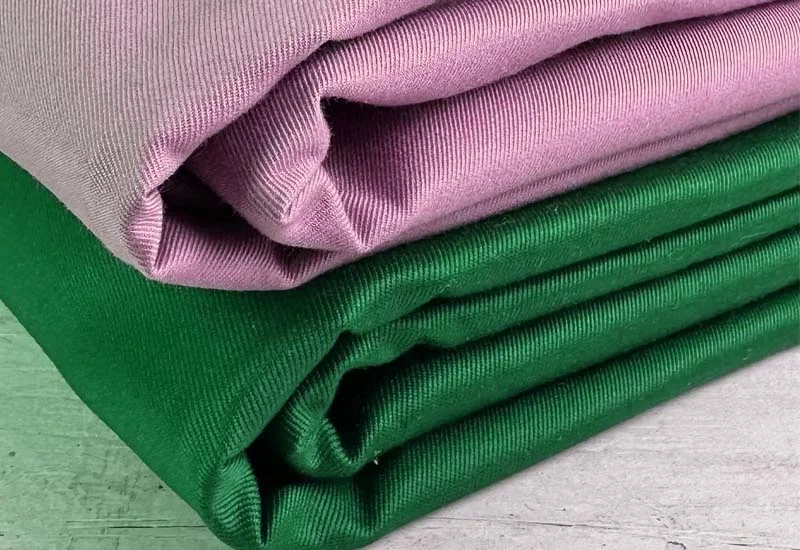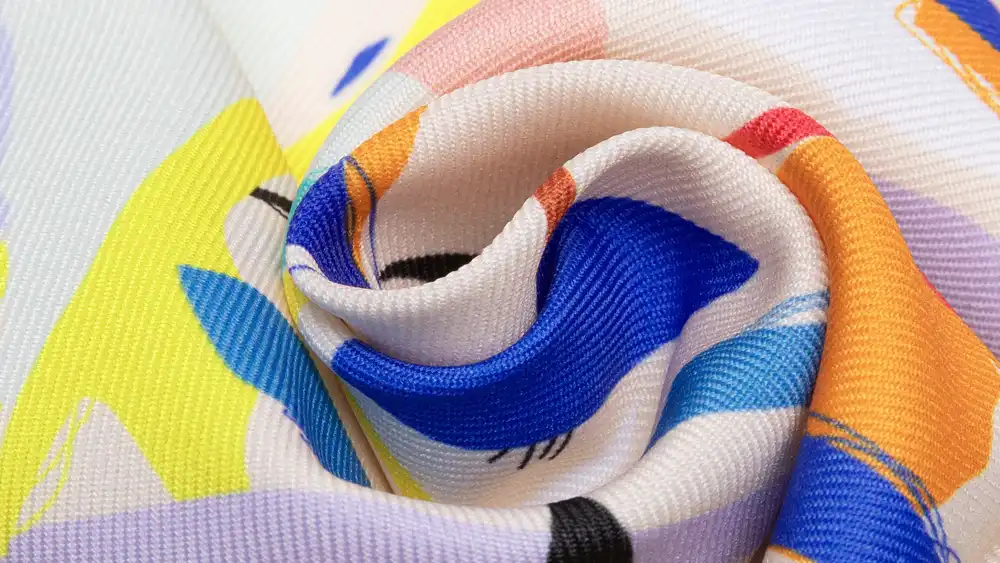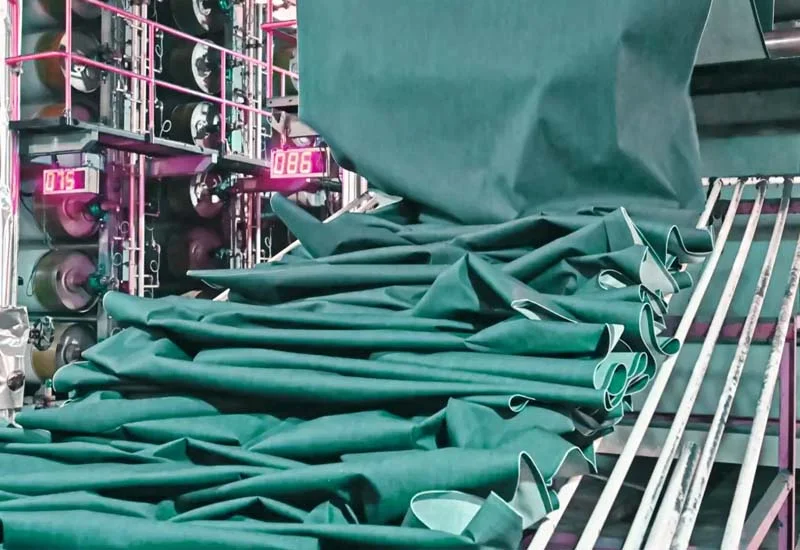Poly twill fabric is a versatile textile famous for its durability, flexibility, and widespread applications across various industries. Therefore, What is Poly Twill Fabric is of great significance to various industries.
Combining the resilience of polyester with the distinctive twill weave, this fabric offers a perfect blend of functionality and aesthetic appeal.
Dive into the realm of poly twill fabric to unravel its secrets, understand its characteristics, and explore its myriad uses.
What Is Poly Twill Fabric

Poly twill fabric is a type of textile woven in a twill pattern, characterized by diagonal parallel ribs. This weaving technique enhances the fabric’s durability and strength, making it suitable for a range of purposes.
Polyester, a synthetic fiber, serves as the primary component of poly twill fabric. Known for its resistance to wrinkles, shrinking, and stretching, polyester contributes to the fabric’s longevity and low maintenance requirements.
Types of Poly Twill

Poly twill fabric comes in various types, each tailored to meet specific needs across different industries.
Lightweight Poly Twill is known for its sleek and soft texture, making it perfect for everyday clothing such as jackets, pants, skirts, and casual wear. Its lightweight nature allows for comfort and ease of movement, making it an excellent choice for apparel that requires a balance between style and functionality.
Heavyweight Poly Twill offers superior durability and abrasion resistance, making it ideal for more demanding applications like industrial uniforms, workwear, upholstery, and heavy-duty bags. This type maintains a structured look and provides the strength needed for items subjected to frequent use and wear.
Poly Twill Blends incorporate fibers such as cotton or wool, adding unique benefits like increased comfort, breathability, or warmth. These blends enhance the versatility of poly twill, making it suitable for tailored suits, cozy outerwear, or other garments that demand a specific feel or thermal property, broadening its scope across diverse fashion and functional requirements.
Key Features of Poly Twill Fabric
Poly twill fabric possesses several distinctive features that contribute to its popularity and versatility:
Durability: Poly twill fabric is renowned for its robustness, making it highly resistant to wear and tear. This durability ensures longevity, making it suitable for various applications where resilience is crucial.
Flexibility: Despite its sturdy construction, poly twill fabric remains flexible and easy to work with. This flexibility allows for comfortable wear in clothing and enables creative designs in various projects.
Color Retention: The vibrant colors of poly twill fabric stay vivid over time, even after multiple washes and exposure to sunlight. This exceptional color retention adds to its visual appeal and longevity.
Water Resistance: Due to the polyester component, poly twill fabric exhibits water-resistant properties. This feature makes it ideal for outdoor use, such as in raincoats, tents, and other weather-resistant applications.
Applications of Poly Twill Fabric

The versatility of poly twill fabric finds expression in various industries and settings:
- Apparel: From sturdy workwear and outdoor clothing to fashionable garments and accessories, poly twill fabric caters to diverse fashion needs.
- Home Furnishings: Upholstery, draperies, and decorative accents benefit from the durability and aesthetic versatility of poly twill fabric.
- Industrial Uses: The robust nature of poly twill fabric makes it ideal for industrial purposes such as banners, covers, and protective gear.
- Outdoor Gear: Tents, backpacks, and outdoor furniture often feature poly twill fabric due to its weather-resistant properties and durability.
Advantages of Poly Twill Fabric
Poly twill fabric offers numerous advantages, making it a preferred choice for many applications:
- Low Maintenance: Resistant to wrinkles and shrinking, poly twill fabric requires minimal care and upkeep, saving time and effort.
- Longevity: With its high durability and resistance to wear, poly twill fabric outlasts many other textiles, providing excellent value for money.
- Versatility: From casual clothing to industrial applications, poly twill fabric adapts to a wide range of uses, showcasing its versatility.
- Colorfastness: The vibrant colors of poly twill fabric remain vibrant and fade-resistant, ensuring enduring visual appeal.
Manufacturing Process

Fiber Selection: Begin by selecting high-quality polyester fibers. These fibers are chosen for their durability, strength, and versatility, making them ideal for producing poly twill fabric.
Weaving Process: The selected polyester fibers are woven using the twill technique. This involves crossing the weft threads over and under the warp threads in a specific diagonal pattern, which creates the characteristic diagonal ribbing of twill fabric.
Dyeing: After weaving, the fabric undergoes dyeing. This process involves adding color to the fabric to achieve the desired shade or pattern, enhancing its aesthetic appeal.
Heat Setting: The fabric is then heat set, a process that uses high temperatures to stabilize the fabric’s structure, ensuring it retains its shape and size while improving its performance, such as wrinkle resistance.
Final Finishing: The fabric undergoes final finishing touches, which may include treatments to enhance softness, add water resistance, or improve other performance attributes, preparing the poly twill fabric for its end-use applications.
FAQs about Poly Twill Fabric
Is poly twill fabric suitable for outdoor use?
Yes, poly twill fabric’s water-resistant properties make it an excellent choice for outdoor applications such as tents and outdoor furniture covers.
Can poly twill fabric be dyed?
Yes, poly twill fabric readily accepts dyes, allowing for customization and a wide range of color options.
Is poly twill fabric prone to wrinkling?
No, poly twill fabric is resistant to wrinkles, maintaining a smooth and neat appearance even after extended use.
How does poly twill fabric compare to cotton twill?
Poly twill fabric offers enhanced durability and color retention compared to cotton twill, making it suitable for a broader range of applications.
Can poly twill fabric be used for upholstery?
Yes, poly twill fabric’s durability and colorfastness make it an excellent choice for upholstery projects, providing both style and functionality.
Is poly twill fabric eco-friendly?
While polyester, the primary component of poly twill fabric, is not biodegradable, efforts are underway to develop eco-friendly alternatives and recycling processes.
Conclusion
In conclusion, poly twill fabric stands out as a durable, versatile, and low-maintenance textile suitable for a myriad of applications. With its robust construction, vibrant colors, and resistance to wear and tear, it meets the diverse needs of industries, fashion enthusiasts, and homemakers alike. Embrace the enduring qualities of poly twill fabric for your next project and experience the perfect blend of functionality and style.
F&A Fabric is a leading wholesale fabric supplier such as quilting fabrics, serving retail stores, online fabric stores, international wholesalers, and designers worldwide.
Please feel free to contact us at any time if you are interested in the poly twill fabric.
